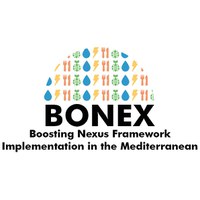BONEX
Boosting Nexus Framework Implementation in the Mediterranean

Coordinatore: Bioazul S.L.
Ambito di ricerca: Ingegneria agraria
Responsabile Scientifico: Attilio Toscano
Durata: 01/05/2022 - 30/04/2025
Gruppo di ricerca: Attilio Toscano, Stevo Lavrnic, Gabriele Baroni
BONEX proposal addresses the Water, Energy, Food and Ecosystems Nexus (WEFE Nexus) in the Mediterranean Region (MedRegion). It aims to catalyse actions for WEFE implementation by improving policies and governance and their im-plementation in practice. The approach to achieve this objective is the creation of a novel, robust, transdisciplinary platform and BONEX also includes exploitation and dissemination of final product with a focus in promoting inclusive innovation and upscaling at the national and the relevant hydrological scale. The novel WEFE Bridging Framework (na-med WEFeF) will be iteratively developed and tested in seven carefully selected Demonstration Projects covering a diversity of situations and challenges in the MedRegion. WEFeF will be also applied to 5 replication sites and further upscaling is included, ensuring that results are truly replicable and that wide socio-ecological and social and natural diversity of the MedRegion are well considered. WEFeF will be developed throughout multi-actor processes, with close collaboration between all value chain relevant actors, such as water right holders, farmers, agri-food chain agents, pu-blic administration, technology providers, researchers, civil society organizations, and consumers.
The seven demonstration cases have been selected based upon the criteria of technological or local available infrastruc-ture with a wide regional distribution covering socioeconomic and representativity of the different Mediterranean WEFE conflicts (social and environmental). It also focuses on emerging or stablished technologies that are already being im-plemented in the region: a) water saving and conservation; b) wastewater reuse; c) desalination; d) solar irrigation; e) Agrivoltaics and f) nature-based solutions. Demonstration cases are: Alqueva (POR), La Axarquia (ESP), Bekaa Valley (LBN), Wadi Mujib (JOR), Ouardanine (TUN), Souss Massa Basin (MOR) and Loragba-Botte (ITA).
BONEX will contribute towards the achievement of several United Nations Sustainable Development Goals (SDGs): SDG 2 (zero hunger), SDG 6 (clean water and sanitation), SDG 7 (energy), SDG 12 (innovative forms of production), SDG 13 (fighting climate change), SDG 15 (healthy ecosystems), and SDG 17 (strengthening partnership for sustainable deve-lopment). The BONEX framework will combine global applicability with strong local involvement, both by focusing on local context. BONEX will adopt a holistic view to integrate water accounting so that we account for” real water savings” and avoids rebound effects for water and energy.
BONEX methodology has the following phases: 1. Establishment of a replicable and adaptive transdisciplinary fra-mework 2. Assessing a context specific WEFE solution approach (applied to demonstration cases), 3. Testing the com-bination of existing tools to assess trade-offs and synergies, 4. Scaling up WEFE Nexus practice (including 5 replication sites), 5. Informing strategic policy processes and 6. Exploitation of results with close involvement of the private sector.
BONEX will make explicit the trade-offs between WEFE components such as the increase of energy use caused by water saving technologies, wastewater reclamation or desalinization. Additionally, it will look for synergies in some technolo-gies such as Agrivoltaics and Solar irrigation where farming and rural communities may improve production and well-being. Additionally, BONEX will also address potential conflicts and risks (such as rebound effect). The novel WEFE Brid-ging Framework will be disseminated widely providing policymakers and practitioners with accessible tools to evaluate trade-offs and synergies and nexus solution approached transdisciplinary manner.